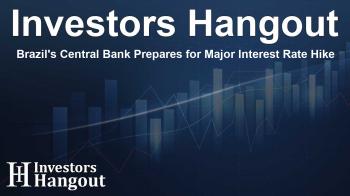Brazil's Central Bank Prepares for Major Interest Rate Hike

Brazil's Central Bank to Implement Significant Rate Increase
The central bank of Brazil is gearing up for a notable adjustment in its monetary policy by raising its benchmark interest rate by 100 basis points on January 29. This shift comes at a time of heightened concern regarding inflation, indicating a broader trend that could see borrowing costs soar to levels not witnessed in nearly two decades. Such measures are not only pivotal for Brazil's economy but also for understanding global monetary trends.
Examining the Rate Hike
The anticipated move on January 29 has been affirmed in recent communications from policymakers. This increase marks the Banco Central do Brasil's (BCB) second full percentage point adjustment after a December 2023 surprise increase that rocked market expectations. Economic analysts are now contemplating the potential trajectories for borrowing costs, with predictions of further adjustments ahead.
Challenges Under New Leadership
This decision will be the first major action undertaken by the recently appointed bank governor Gabriel Galipolo. He faces mounting economic pressures domestically, along with the unpredictable climate in global markets. These challenges signal a complex landscape for decision-making as the central bank navigates through various economic indicators.
Implications for the Future
The Copom—Brazil's monetary policy committee—is projected to elevate the Selic rate from the current 12.25% to 13.25% this January. The decision is based on the latest inflation expectations gleaned from a survey of economists conducted between January 21 and 24, involving 38 financial analysts. With increasing inflation creating unrest globally, Brazil's adjustments are critical to maintaining economic stability.
Market Influences and Comparisons
The BCB's monetary policy adjustments are becoming increasingly relevant beyond Brazil, offering insights into potential shifts in global monetary policy, including that of the United States. Historically, Brazil's decisions have often predated similar moves made by the Federal Reserve. The Selic was initially raised in March 2021, reversing pandemic-driven low borrowing costs before recently trending downward in August 2023, leading analysts to predict its next rise.
Looking Ahead: More Increases Expected
Based on additional surveys, all responding economists foresee a third consecutive increase of 100 basis points in March, pushing the rate to 14.25%. This upcoming increase signifies a reaction to Brazil's unique inflationary environment, with the absence of any Copom meetings scheduled in February.
Understanding the Economic Landscape
Experts, including economist Tomas Goulart from Novus Capital, emphasize the necessity for robust adjustments in the Selic rate, indicating a need for at least another 200 basis points increase. Such insights are invaluable as Brazil's economic forecasting predicts that the Selic rate may peak at around 15.00% in the near term, marking the highest benchmark since 2006.
Inflation Projections and Economic Consequences
Current projections foresee consumer prices escalating by an average of 5.08% through the end of 2025, significantly overshooting Brazil's inflation target of 3% plus or minus 1.5 percentage points. Economists are increasingly vocal about the challenge of controlling inflation, suggesting that achieving lower inflation rates may require a Selic rate upwards of 15.75% under prevailing conditions.
Conclusion: Navigating a Volatile Economic Future
As the BCB prepares to implement these substantial interest rate hikes, the implications extend beyond national borders, highlighting Brazil's role in the global economic framework. The coming months will be crucial not only for Brazil's economy but also for international investors and policymakers monitoring the shifts in monetary strategy.
Frequently Asked Questions
What is the purpose of Brazil's central bank raising interest rates?
The increase aims to curb inflation and stabilize the economy by managing borrowing costs.
How much is the interest rate expected to increase in January?
The interest rate is anticipated to rise by 100 basis points, reaching 13.25%.
Who is the current governor of Brazil's central bank?
Gabriel Galipolo is the newly appointed governor responsible for the upcoming rate decisions.
What challenges does the central bank face?
There are rising domestic economic challenges and heightened global market volatility that complicate decision-making.
What are the future projections for Brazil's Selic rate?
Analysts predict that the rate may peak at around 15.00% next quarter, contingent on inflation trends.
About Investors Hangout
Investors Hangout is a leading online stock forum for financial discussion and learning, offering a wide range of free tools and resources. It draws in traders of all levels, who exchange market knowledge, investigate trading tactics, and keep an eye on industry developments in real time. Featuring financial articles, stock message boards, quotes, charts, company profiles, and live news updates. Through cooperative learning and a wealth of informational resources, it helps users from novices creating their first portfolios to experts honing their techniques. Join Investors Hangout today: https://investorshangout.com/
Disclaimer: The content of this article is solely for general informational purposes only; it does not represent legal, financial, or investment advice. Investors Hangout does not offer financial advice; the author is not a licensed financial advisor. Consult a qualified advisor before making any financial or investment decisions based on this article. The author's interpretation of publicly available data presented here; as a result, they should not be taken as advice to purchase, sell, or hold any securities mentioned or any other investments. If any of the material offered here is inaccurate, please contact us for corrections.
